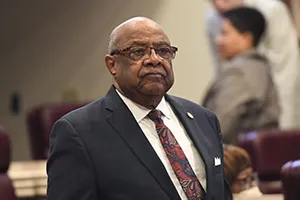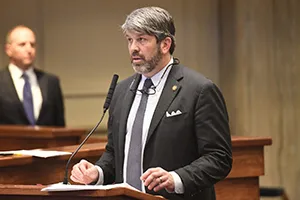 As several days are left in Alabama’s legislative session to decide if gambling should be brought to voters, lawmakers carry on with the discussions behind closed doors. The conference committee is composed of three House members (Sam Jones, D-Mobile, Andy Whitt, R-Harvest, and Chris Blackshear, R-Phenix City) and three senators (Greg Albritton, R-Atmore, Garlan Gudger, R-Cullman, and Bobby Singleton, D-Greensboro).
As several days are left in Alabama’s legislative session to decide if gambling should be brought to voters, lawmakers carry on with the discussions behind closed doors. The conference committee is composed of three House members (Sam Jones, D-Mobile, Andy Whitt, R-Harvest, and Chris Blackshear, R-Phenix City) and three senators (Greg Albritton, R-Atmore, Garlan Gudger, R-Cullman, and Bobby Singleton, D-Greensboro).
Conference committees are organized when either the House or Senate make amendments to an approved bill and are focused on reaching an agreement and reconciling differences.
The Alabama legislative session will officially end on May 20. The gambling bill would require the approval of three-fifths in both chambers. State voters would ultimately decide the fate of gambling in the November general election.
As reported by the Alabama Reflector, Representative Sam Jones said that while he could not provide further information on the specifics, progress was made with regard to tackling the differences between the House and Senate bills. He added that, ultimately, the aim was reaching “an agreement that is fair and that yields the best results for the people of Alabama.” He explained that the committee plans on carrying out a public meeting in the future.
House Bills 151 and 152, both sponsored by Representative Chris Blackshear, R-Smiths Station, initially proposed creating a lottery and a state gambling commission and authorizing sports betting and casino gaming across seven locations in the state. Negotiating a compact with the Poarch Band of Creek Indians that run casinos in Atmore, Montgomery, and Wetumpka was also included in the proposed legislation.
In March, the Alabama Senate approved the gambling legislation from the House of Representatives, however, with substantial modifications. The Senate version dropped sports betting and approved three tribal casinos, and a state lottery. It also added pari-mutuel betting on horse and dog races at seven state-owned race tracks.
The Distribution of Gaming Revenue Is Key Consideration for Lawmakers
 Apart from these differences, the House and Senate have had conflicting perspectives on how the gaming revenue should be distributed and the timing of the election on the issue. While the revenue projections for both versions are substantially different, lawmakers consider the distribution of the gaming tax revenue as a key topic.
Apart from these differences, the House and Senate have had conflicting perspectives on how the gaming revenue should be distributed and the timing of the election on the issue. While the revenue projections for both versions are substantially different, lawmakers consider the distribution of the gaming tax revenue as a key topic.
Representative Sam Jones highlighted the importance of the proper distribution of the gaming tax revenue to sectors such as public education, healthcare, and infrastructure: “As revenue is produced for our state, it is critical that the entire process is fair and equitable throughout the state.”
Senator Garlan Gudger, R-Cullman, also commented on the topic of money allocation and shared his view that a substantial portion should go to supporting mental health and scholarships for education.